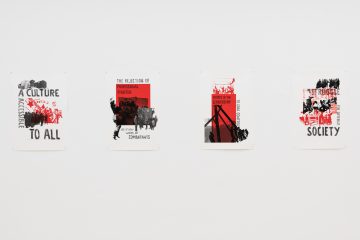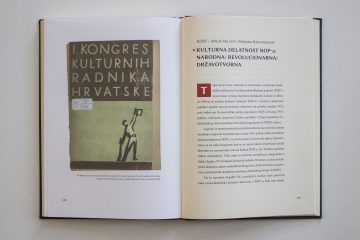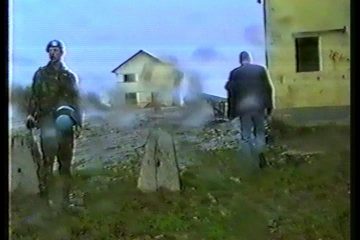BÜCHS’N’RADIO in March
Start Up Lectures 2016-17: Image Diplomacy
A broadcast in collaboration with Vladislav SHAPOVALOV
——————————-
In 2016-17, the Fellowship Program for Art and Theory at Künstlerhaus Büchsenhausen focuses on projects concerned with physical deviance, educational spirits, apparently obsolete image production processes, and former geopolitics. In the context of the Start Up Lectures 2016-17 on 21 October 2016, the new fellows Eva Egermann, Stefan Hayn, Kerstin Schroedinger, and Vladislav Shapovalov presented their work and their plans for the coming months.
In the March broadcast you can hear the presentation by Vladislav Shapovalov.
Vladislav Shapovalov (*1981, Rostov-on-Don, Russia) is an artist and researcher living and working in Milan and Moscow. Between 1999 and 2007 he was a member of the art-group Radek Community. Since 2008 he has been working independently on projects that focus on rethinking images, cultural artifacts and the construction of narratives as a way to construe and analyze geopolitical configurations.
Shapovalov’s artistic research Image Diplomacy investigates the specific functions of the image in the system of political culture. The project intends to bring to light certain historic aspects of constructing the political-imaginary of the 20th century through exhibition strategies and the photographic medium, and to draw conclusions for the present day. The research is based on materials from an archive, located in Milan, containing photographic prints and films sent by the All-Union Society for Cultural Relations with Foreign Countries, founded in the USSR in 1925, to the countries of Western Europe. The aim of this intervention by the „Soviet exhibition complex” was to represent socialist modernity and disseminate a positive and controlled image of the USSR and Soviet life during the period of the Cold War.
The main concern of Vladislav Shapovalov’s research is the cultural and visual mechanics behind the formulation of political imaginations, immanent to different societies in different historical periods, through the use of exhibition strategies and photography. Although the project is historically grounded, it is concerned less with fathoming how things actually were and more with how they appear in retrospect. It aims to rediscover and rescue the past but not for nostalgic reasons. The goal is to blast holes in established western interpretations of the twentieth century, freeing up new perspectives that allow for critical reappropriations of its legacy, and reflections on the current interplay between images, politics and society.
BÜCHS’N’RADIO im März
Start Up Lectures 2016/17: Image Diplomacy
Eine Sendung in Zusammenarbeit mit Vladislav SHAPOVALOV
——————————-
Das Fellowship-Programm für Kunst und Theorie stellt im Jahr 2016/17 Arbeitsvorhaben in den Mittelpunkt, die sich mit körperlichen Devianzen, Bildungsgeistern, scheinbar obsoleten Bildproduktionsverfahren und ehemaligen Geopolitiken befassen. Im Rahmen der Start Up Lectures am 21. Oktober 2016 stellten die neuen Fellows Eva Egermann, Stefan Hayn, Kerstin Schroedinger und Vladislav Shapovalov sich und ihr jeweiliges Arbeitsvorhaben für die kommenden Monate vor.
In der März-Sendung von Büchs’n’Radio hören Sie die Präsentation von Vladislav Shapovalov.
Vladislav Shapovalov (*1981, Rostow-am-Don, Russland) lebt als Künstler und Forscher in Mailand und Moskau. Er war Mitglied der Künstler_innengruppe Radek Community (1999-2007). Seit 2008 arbeitet er als Einzelkünstler an Projekten, die sich vor allem mit der Neubewertung von Bildern, kulturellen Artefakten und der Konstruktion von Narrativen beschäftigt, die dazu dienen, geopolitische Konfigurationen zu konstruieren und zu analysieren.
Shapovalovs künstlerische Investigation Image Diplomacy erforscht die spezifischen Funktionen des Bildes im System politischer Kultur. Das Projekt beabsichtigt, bestimmte historische Aspekte der Konstruktion des Politisch-Imaginären durch Ausstellungsstrategien und das Medium der Fotografie im 20. Jahrhundert zu beleuchten und mögliche Schlüsse für die Gegenwart zu ziehen. Die Investigation basiert auf den Materialien eines Archivs mit Sitz in Mailand, das Fotografien und Filme bewahrt, die von der 1925 in der UdSSR gegründeten „Allunionsgesellschaft für kulturelle Beziehungen mit dem Ausland“ an die Länder im Westen Europas geschickt wurden. Das Ziel dieser Intervention des „Sowjetischen Ausstellungskomplexes“ bestand darin, die sozialistische Moderne zu repräsentieren und ein positives und kontrolliertes Bild der UdSSR und des Lebens in der Sowjetunion während des Kalten Krieges zu vermitteln.
Shapovalovs Interesse gilt vor allem den kulturellen und visuellen Mechanismen hinter der Formulierung politischer Imaginationen, die in unterschiedlichen Gesellschaften und in diversen geschichtlichen Perioden jeweils immanent waren, in den Formaten Ausstellung und Fotografie. Auch wenn das Projekt sich mit historischen Grundlagen auseinandersetzt, geht es jedoch dabei weniger darum, auszuloten, wie die Dinge tatsächlich waren als darum, wie sie im Rückblick erscheinen. Das Projekt will die Vergangenheit neu entdecken und vor dem Vergessen bewahren, allerdings nicht aus nostalgischen Gründen. Vielmehr sollen Perforationen in die im Westen etablierte Interpretation des 20. Jahrhunderts vorgenommen werden, um dadurch neue Perspektiven zu eröffnen, die einerseits eine kritische Neuaneignung dieses Erbes, andererseits aber auch Reflexionen über das derzeitige Zusammenspiel zwischen Bildern, Politik und Gesellschaft ermöglichen.













